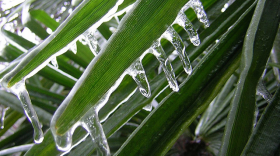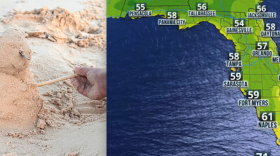It's been a tough year to be a bat in Southwest Florida.
In January, bats potentially infected with rabies disrupted a gym in Naples. Bats somehow got inside the facility and the Florida Department of Health got involved, worried patrons or staff may have held or been in contact with the creatures.
Bats, along with raccoons, are the animals in Florida most likely to carry rabies, a virus that can cause an illness in people that is nearly always fatal if not treated.
In February and for the second time, environmental agencies had to step up to the plate for the endangered Florida bonneted bat. The Center for Biological Diversity was among those who filed the required paperwork to sue the federal Fish and Wildlife Service for failing to create a safe haven for the creature, which is the largest bat in the state and the rarest one in the nation.
Now in April, it is the newest of the flying mammals at peril, this time from perhaps unwitting humans. The Florida Fish and Wildlife Conservation Commission is concerned that baby bats may be stranded by residents sealing up leaks and cracks in their home as the summer heat is set to arrive.
April 15 marks the start of bat maternity season and is the last day to legally exclude bats from your home or building.
Holly K. Ober, a former associate professor in the Department of Wildlife Ecology and Conservation at the University of Florida who specializes in bats, is now with the Oregon State University College of Forestry.
"During the summer, when pregnant and nursing female bats have especially high energy requirements, each bat may consume as much as two thirds of its body weight per night," she said. "This would be the equivalent of a 150-pound human consuming 100 pounds of food per day."
The FWC recently wrote: "Florida’s 13 native bat species are generally beneficial and typically roost in trees, caves or other natural spaces," the agency said. "Sometimes they are attracted to human-made structures," or homes and businesses.
After the baby mammals are born in April it takes until mid-August until the youngsters can care for themselves.
"During that time, it is illegal to block bats from their roosts," the FWC wrote in a statement. "If bats are excluded during maternity season, flightless young can be trapped inside the structure and die."
Despite urban legends that bats get tangled in people's hair and start biting away to spread rabies - or that they are actually a shape-shifted form of a legendary evil creature who has a taste for human blood - bats are one the more beneficial animals worldwide.
A single bat in Florida eats hundreds of insects, including mosquitoes and other garden and agricultural pests. Every night.
The mammal's waste, or guano, is an excellent fertilizer. Bats also easily pollinate plants and spread seeds far and wide.
Jaclyn Lopez, Florida director at the Center for Biological Diversity, said last month when chiding the federal FWS for better protection for bonneted bats, that the mammal it is at grave risk of being wiped out by a changing planet.
“Florida bonneted bats cannot survive the onslaught of sea-level rise, development and pesticide use in South Florida unless their habitat is protected.”
The FWC has an online guide on has to safely exclude bats from your home, which includes a video tutorial. If interested watch it here.
Environmental reporting for WGCU is funded in part by VoLo Foundation, a non-profit with a mission to accelerate change and global impact by supporting science-based climate solutions, enhancing education, and improving health.
If you’re interested in receiving a monthly environmental newsletter from WGCU, sign up for the Green Flash today.








